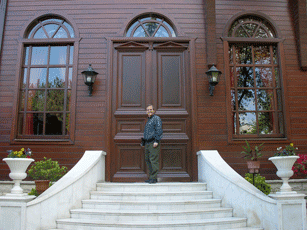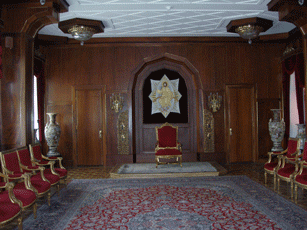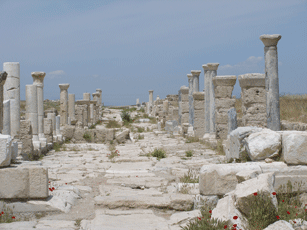Orthodox Again Moving Towards Vatican
Wednesday, July 2nd, 2008

The Above Building is Where the Ecumenical Patriarch of Constantinople Meets with Dignitaries
Zenit.org, a Vatican-supporting news service reported the following on Monday:
Orthodox Patriarch Says Dialogue Is Progressing
VATICAN CITY, JUNE 30, 2008 (Zenit.org).- The Orthodox patriarch of Constantinople says dialogue between the Catholic and Orthodox Churches is going forward, despite “considerable difficulties that exist and the well-known problems.”
Patriarch Bartholomew I affirmed this in his homily Sunday at St. Peter’s Basilica for the feast of Sts. Peter and Paul…
The patriarch stated that the Orthodox “honor and greatly venerate Peter — he who made his salvific confession of the divinity of Christ, as much as Paul — the vessel of election, who proclaimed this confession and faith to the ends of the universe in the midst of the most unimaginable difficulties and dangers. […] To strongly emphasize their equal importance, but also their weight in the Church and her regenerative and salvific work through the centuries, the East honors them in an icon in which they either hold a little ship in their hands, which symbolizes the Church, or they embrace and exchange the kiss in Christ.”It is indeed this kiss that we have come to exchange with you, Your Holiness, emphasizing the ardent desire and love in Christ, things which are closely related to each other.”
Bartholomew I then turned his attention to the progress toward unity between the two Churches.
“The theological dialogue between our Churches ‘in faith, truth and love,’ thanks to divine help, goes forward despite the considerable difficulties that exist and the well-known problems,” he said. “We truly desire and fervently pray that these difficulties will be overcome and that the problems will disappear as soon as possible so that we may reach the desired final goal for the glory of God.
The truth is that the Orthodox are not wise to think that the Catholics do not want to totally absorb them.
In the past I have cited the following:
Abbott Joachim (died 1202)…A remarkable Pope will be seated on the pontifical throne, under special protection of the angels. Holy and full of gentleness, he shall undo all wrong, he shall recover the states of the Church, and reunite the exiled temporal powers. As the only Pastor, he shall reunite the Eastern to the Western Church…This holy Pope shall be both pastor and reformer. Through him the East and West shall be in ever lasting concord. The city of Babylon shall then be the head and guide of the world. Rome, weakened in temporal power, shall forever preserve her spiritual dominion, and shall enjoy great peace…At the beginning, in order to bring these happy results, having need of a powerful assistance, this holy Pontiff will ask the cooperation of the generous monarch of France (Great Monarch)… A man of remarkable sanctity will be his successor in the Pontifical chair. Through him God will work so many prodigies that all men shall revere him (Connor, Edward. Prophecy for Today. Imprimatur + A.J. Willinger, Bishop of Monterey-Fresno; Reprint: Tan Books and Publishers, Rockford (IL), 1984, pp. 31-33).
Last night I ran across another Catholic writing that confirms it:
St. Bridget of Sweden (d. 1373): Let the Greeks know that their empire, their kingdoms, or dominions, shall never be secure or in settled peace…until, with true humility and good will, they shall have devoutly submitted themselves to the Church of Rome and to her faith, conforming themselves entirely to the holy ordinance and rites of that Church (Culleton, R. Gerald. The Prophets and Our Times. Nihil Obstat: L. Arvin. Imprimatur: Philip G. Scher, Bishop of Monterey-Fresno, November 15, 1941. Reprint 1974, TAN Books, Rockford (IL), p. 154).
Now, I should add that I do believe that the Church of Rome will compromise some to accept the Orthodox (and at least one Catholic priest has prophesied that, please see Meeting with the Orthodox in Constantinople).
Because of control, the biblical warnings, and doctrinal reasons, I have long advocated that the Orthodox Must Reject Unity with the Roman Catholics.
Hopefully, individually they will do that before it is too late.
Two articles of possibly related interest may include:
Some Similarities and Differences Between the Orthodox Church and the Churches of God Both groups have some amazing similarities and some major differences. Do you know what they are?
Which Is Faithful: The Roman Catholic Church or the Church of God? Do you know that both groups shared a lot of the earliest teachings? Do you know which church changed? Do you know which group is most faithful to the teachings of the apostolic church? Which group best represents true Christianity? This documented article answers those questions.


